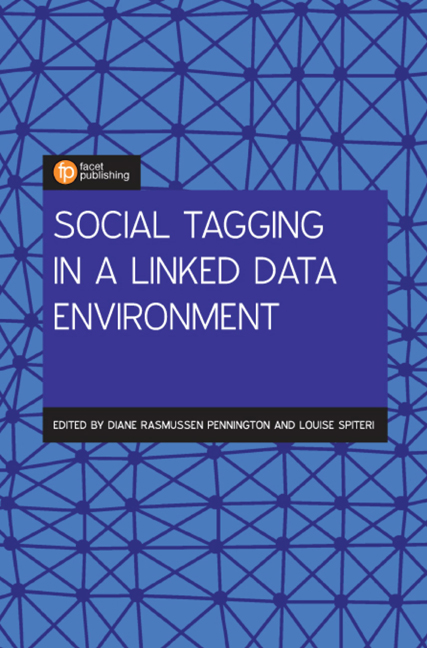Book contents
- Frontmatter
- Contents
- List of figures and tables
- Contributors
- 1 Introduction: the continuing evolution of social tagging
- 2 Tagging the semantic web: combining Web 2.0 and Web 3.0
- 3 Social tags for linked data with Resource Description Framework (RDF)
- 4 Social tagging and public policy
- 5 Hashtags and library discovery systems
- 6 Social information discoverability in Facebook groups: the need for linked data strategies
- 7 #FandomCommunication: how online fandom utilises tagging and folksonomy
- 8 Keys to their own voices: social tags for a dementia ontology as a human right
- 9 Social tagging and the enterprise: an analysis of social tagging in the workplace
- 10 Use and effectiveness of social tagging recommender systems
- Index
5 - Hashtags and library discovery systems
Published online by Cambridge University Press: 01 June 2019
- Frontmatter
- Contents
- List of figures and tables
- Contributors
- 1 Introduction: the continuing evolution of social tagging
- 2 Tagging the semantic web: combining Web 2.0 and Web 3.0
- 3 Social tags for linked data with Resource Description Framework (RDF)
- 4 Social tagging and public policy
- 5 Hashtags and library discovery systems
- 6 Social information discoverability in Facebook groups: the need for linked data strategies
- 7 #FandomCommunication: how online fandom utilises tagging and folksonomy
- 8 Keys to their own voices: social tags for a dementia ontology as a human right
- 9 Social tagging and the enterprise: an analysis of social tagging in the workplace
- 10 Use and effectiveness of social tagging recommender systems
- Index
Summary
Introduction
Over the past several years, I have explored the role of user-generated metadata in library discovery systems, specifically social tagging and user reviews. In a previous monograph from Facet Publishing (Spiteri, 2016), I examined the specific contributions of user-generated metadata in the following areas:
• to enhance library subject analysis systems, such as the Library of Congress Subject Headings
• to provide de facto subject access to items in the catalogue to which few, or no, controlled subject headings have been assigned by library staff
• to enrich the content of bibliographic records through the expertise of the end users
• to enhance readers’ advisory services through the provision of affective access points.
The purpose of this chapter is to examine the feasibility of expanding the scope of user-generated metadata in library discovery systems to include hashtags. Why would we want to do this? One of the possible limitations of library discovery systems is that, for the most part, they provide access only to items that the library system owns. There is nothing wrong with this, of course, as catalogues have traditionally been inventories of holdings. In a world of linked data and the semantic web, however, does this inward focus continue to work well? Can we provide an additional service to clients by linking them to related content that the library system does not own? Through an examination of relevant literature, as well as three specific case studies, this chapter will explore the potential contributions of hashtags to expanding the scope of resources available via library discovery systems.
Hashtags and resource discovery
According to Wikipedia a hashtag is:
a type of metadata tag used on social networks such as Twitter and other microblogging services, allowing users to apply dynamic, user-generated tagging that makes it possible for others to easily find messages with a specific theme or content; it allows easy, informal markup of folk taxonomy without need of any formal taxonomy or markup language.
(Wikipedia, 2018)Hashtags are used in a variety of social media platforms, including Google+, WordPress, Tumblr, Pinterest, Instagram, Facebook and YouTube.
- Type
- Chapter
- Information
- Social Tagging for Linking Data Across Environments , pp. 89 - 108Publisher: FacetPrint publication year: 2018



